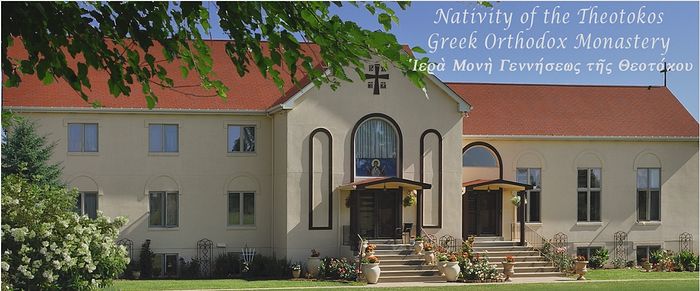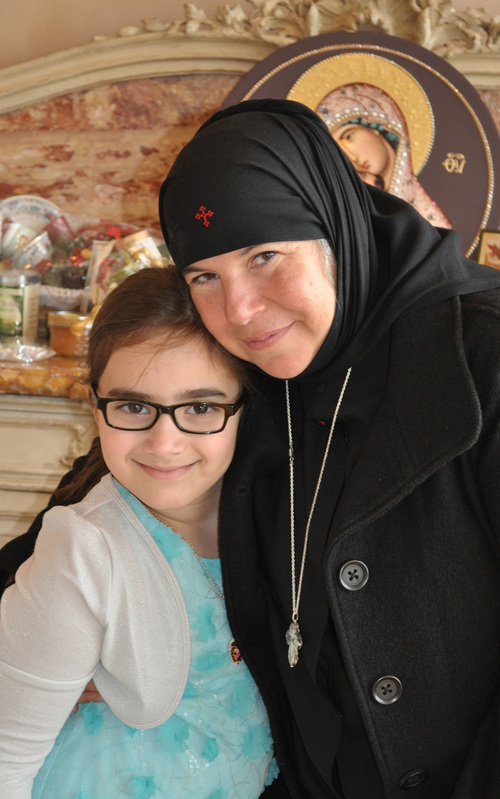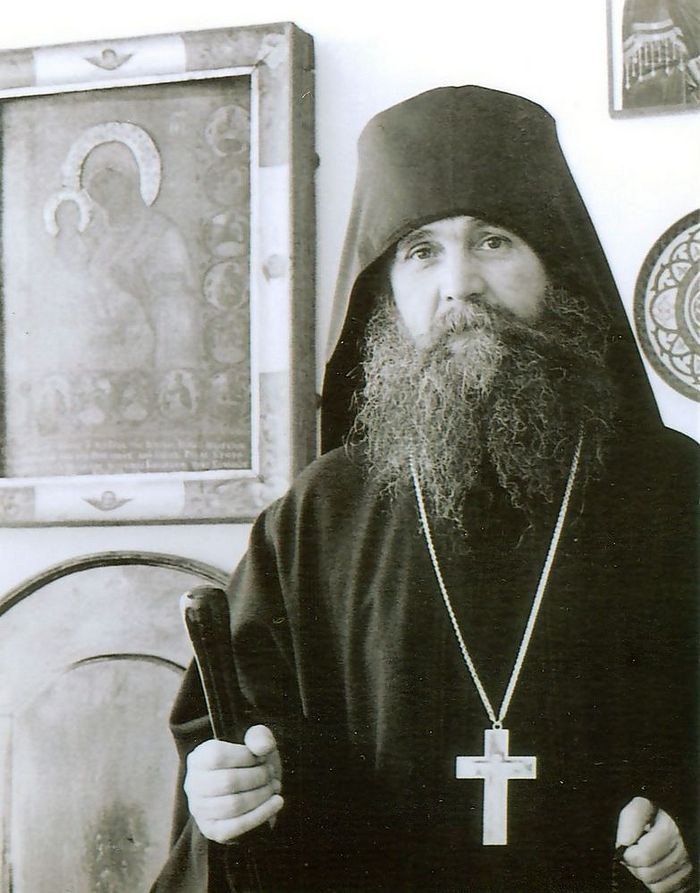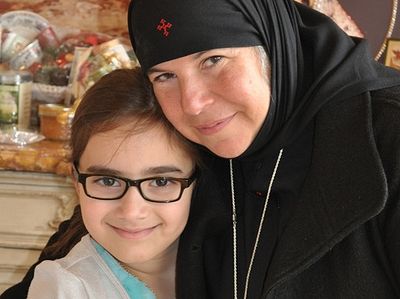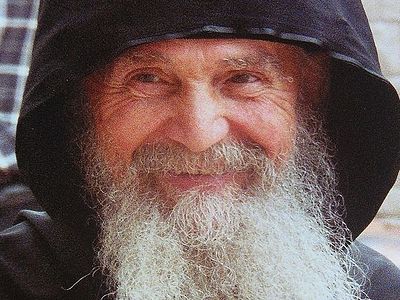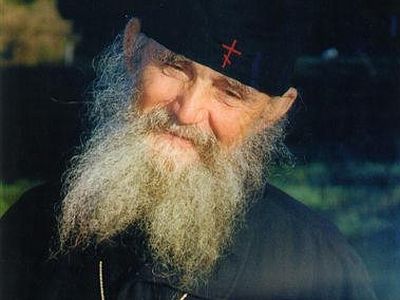Gerontissa Taxiarchia (Dukas) came to the US from the Greek monastery of Panagia Hodigitria in 1989 by the blessing of her spiritual father, the Athonite elder Ephraim (Moraitis) of Philotheou, the spiritual son of the great elder Joseph the Hesychast. Gerontissa Taxiarchia became the first inhabitant and abbess of the Monastery of the Nativity of the Most Holy Theotokos in Saxonburg, Pennsylvania. This monastery was the first of the twenty habitations founded by Elder Ephraim of Philotheou and Arizona on American soil.
The blessed gerontissa[1] Taxiarchia acquired the gifts of ceaseless prayer, of healing the human body and soul, clairvoyance, fervent faith, and the love of Christ. Gerontissa labored in monastic podvigs for many long years. There are known cases of when her prayers healed cancer patients. After Gerontissa Taxiarchia’s blessed repose the Lord attested to her podvig by the appearance of fragrant myrrh on her face. Below is a collection of memories of Gerontissa, from those who knew her well.
Eleana Mitchell, spiritual child of Elder Ephraim:
The blessed Gerontissa Taxiarchia was born and raised in the Greek village of Agria, near the city of Volos. In early childhood, during the civil war, she was left without a father. Her name in the world was Aphrodita Dukas. The blessed gerontissa was generously endowed with beauty, both external and internal. She was, from an early age, as they say, a true bride of Christ.
In early childhood she was diagnosed with severe heart disease. A fight for her health began from that time. From time to time she had to go stay at the hospital in Thessaloniki for at least two months. At first, being still quite young, she had to go to the hospital in Thessaloniki completely on her own, due to a lack of funds in her family. No one visited her, as they did other patients, and she received no communications. It was then that the manliness of her soul was first manifested.
All alone in a strange city, amidst unknown people, growing weak, emaciated, with sunken cheeks, the young girl battled her illness alone, dreaming only of how to see her mama sooner and tell her about all her sufferings. However, when this long-awaited day finally arrived, and her mother came to see her, Aphrodita as if heard the voice of God, which enlightened her to refrain from speaking about her sufferings. It’s as if her ego was put in second place.
She began to reason with wisdom surprising for her young age: “Oh, how I grieve for my mama, poor widow! After all, doesn’t she love me? Doesn’t she worry about me?” And, recognizing in this inner voice the voice of God, Aphrodita said to her mother: “Oh, dear mama! I’m fine in the hospital: they take care of me and feed me here! There are several women who visit me and bring me sweets, and chocolates and books. Time flew by so quickly!” “Then, Aphrodita, you weren’t upset that I couldn’t often visit you?” “No, mama, I didn’t have any time to be sad or upset!” Her words greatly comforted her mother and she returned home with peace of soul.
The girl was again left alone, but now her sickness and needs were of no consequence in comparison with the joy of seeing and comforting her mother.
At that time, she prayed every day, as she herself told us, that the Lord would take her from this life, because she saw herself as undeserving and worthless and only complicating the lives of her mother, brothers, and sisters.
But the Omniscient God did not fulfill her request, but instead vouchsafed her to accept the angelic schema in the monastery of the Panagia Hodigitria, not far from Volos, with the great gerontissa Macrina, who taught her and nourished within her, along with the other sisters of the monastery, the virtues of sacrifice, love, patience, and obedience.
As I recall from her words, she said: “Do you know when I understood why the Lord didn’t take me then? When Elder Ephraim told me, when I was fifty, that I had to live in America!”
Blessed be the Lord God, leaving this blessed soul on earth, that we might be granted to meet and get to know her! The blessed gerontissa was a pious, chaste, good, and noble eldress, prone to self-sacrifice. She was the guardian of orphans here in the US.
The good things of the world and worldly viewpoints didn’t interest her in the slightest. Mother’s sole concern was the salvation of all, and of her own soul. Day and night, despite being tired to the point of exhaustion, she gave herself to heartfelt prayer. “Have you ever slept standing up, with open eyes?” Gerontissa asked us, smiling with her blessed smile which filled our hearts with heavenly bliss. “No, Gerontissa, never!” “It has happened to me,” answered this blessed soul.
Without any abuse, rigor, condemnation or reproach, but only with her kindness and gentleness, she could easily open a person’s soul and purify it. And she knew how to make every one of your days spent with her lived to the glory of God! As soon as the sun rises in the dawn, you immediately and involuntarily say: “What can I do today to thank God?” and you do it automatically, from your whole heart.
She fell asleep in the Lord on August 3, 1994. From the hospital to the monastery huge pure streams of rain accompanied her exodus. There was another miracle—that numerous sweet-smelling droplets of myrrh, glistening in the sun, appeared on her face after death. We all experienced this blessed “joyful sorrow.”
Gerontissa Theophano, the current abbess of the Monastery of the Nativity of the Most Holy Theotokos:
Gerontissa Taxiarchia came to Pennsylvania in 1989 in July, and I came in March 1990, from New York. At first we just had a small wooden home with two bedrooms, and nothing more. We were three sisters.
When Elder Ephraim came to visit our monastery for the first time (at that time he would spend three months in America and nine months at Philotheou Monastery on Mt. Athos), I said to him, about Gerontissa Taxiarchia: “She is truly a saint!” which was obvious from first sight. And he answered me: “I sent here one of my best nuns… No, she is my very best nun.”
Gerontissa Taxiarchia really was a holy person. She had a heart condition, and upon arriving in America they discovered she had breast cancer. Other women suffering from cancer were healed by her prayers. For example, there was a case where once three or four pilgrims visited us to meet with Gerontissa. Among them was one nun, the mother of one of our sisters, who was discovered to have cancer. She wanted to tell Gerontissa about it, but she didn’t allow her to say anything, only repeating: “It’s nothing, nothing.” And so, not asking anything, Gerontissa touched the place where the cancer was found.
Nuns usually avoid touching, but Gerontissa touched precisely on the suffering spot and said to her: “Don’t worry, matushka, you are all clean.” When matushka returned home, the doctors couldn’t find any cancer at all.
Another pilgrim, who also had breast cancer, came to us as part of the same group. Gerontissa Taxiarchia was giving out something as a blessing, and this woman wanted to stand in line. Here Gerontissa begins to push her out of the line. This pilgrim was quite surprised and after a while came back and stood again at the end of the line. Gerontissa again asked her to leave. This repeated several times, and then Gerontissa said to her: “You have no more cancer.”
Another miracle occurred with a family from Tennessee that we know well. Throughout many years they had no children, and Gerontissa said to them: “Don’t fret! Next year you will come to me with a child.” And so it happened that in a year they visited with their newborn daughter.
There was another case of healing already after Gerontissa’s death. There was a woman who worked in a beauty salon as a hairdresser. From working with chemicals for so many years she had serious problems with her fingernails. She took oil from the lampada that we lit in church during Gerontissa’s funeral. We always add oil to this lampada. So, this woman anointed her fingers with the oil from the lampada and after that she was healed.
There was another woman, who has already passed away, who from her youth suffered from a very severe form of asthma. She helped Elder Ephraim with the building of our monastery. Before Gerontissa reposed, this woman asked her: “Gerontissa, can I ask you a favor? Please, take away my asthma!” Then after Gerontissa’s death, and this woman was already around eighty years old, her asthma left her forever.
We have accumulated many such stories. She was holy, a real saint. Just like Elder Ephraim, she was able to read our thoughts. She was all love.
Because she was the first of Elder’s nuns to move to America, and also because of her all-consuming love, women from completely different places sought her out, from the places where other monasteries of Elder Ephraim were subsequently built—from New York, Chicago, and so on. Sometimes she would tell these pilgrims: “When you build a monastery for your home, don’t forget that you should help your gerontissa just as you help me.” Thus she prepared them for this mission beforehand.
One day a man brought us an old icon of the Most Holy Theotokos. He didn’t realize what kind of icon it was. This was an Orthodox man married to a Protestant. His wife was going to throw out all the icons. It so happened that two nuns, mother and daughter, passed by and heard their conversation, as he tried to convince his wife not to toss the icons. They suggested that he give the icons to the monastery.
The man came to the monastery with the icon wrapped up and said to Gerontissa: “I won’t open it until tomorrow.” He didn’t realize what a treasure he had. They next day we celebrated the “Unfading Bloom” icon of the Mother of God. They unwrapped the bundle and saw that it was precisely the same icon, the “Unfading Bloom.” When Gerontissa took the icon, the whole monastery was filled with the sweet scent. You could smell it everywhere—upstairs, downstairs, even in the basement. This icon is still in our monastery.
Gerontissa Taxiarchia departed to the Lord on August 3, 1994 at the age of fifty-eight. Probably about a thousand people came here for her funeral. Each person felt loved by Gerontissa more than all…
When Gerontissa reposed, before we buried her, droplets of myrrh appeared on her face, which emanated a wondrous fragrance. I collected this myrrh with cotton which I have kept until now. It’s been twenty-one years, and that cotton swab to this day is fragrant.
Nun Nektaria, oldest inhabitant of the Monastery of Panagia Hodigitria in Portaria:
I knew Gerontissa Taxiarchia from the moment she arrived to our monastery. She had a heart condition and had to undergo two heart surgeries: one while she was still living in the world, and the second after she had become a nun. Before the first operation she made a vow: if the operation would be successful then she would spend six months in a monastery, helping the sisters and praying, in this way thanking the Most Holy Theotokos.
Having spent six months in Portaria, she realized that she liked the monastic life and that she wanted to stay here. She began to ask Gerontissa Macrina to accept her into the monastery. At first Gerontissa was afraid to keep her, fearing that her weak heart couldn’t endure the severe monastic style of life. But she so begged and was so kind and obedient that in the end Gerontissa agreed, and Elder Ephraim blessed her to stay.
Gerontissa Taxiarchia was very quickly accounted worthy of tonsure into the schema, because, in the words of Gerontissa Macrina, “she was completely ready for it.”
She had obediences in the kitchen and guest house. Gerontissa Macrina had high blood sugar, and Sister Taxiarchia prepared her food. She attended to this obedience very attentively, measured everything meticulously—how much of what to add so as not to violate the doctor’s orders. She loved her gerontissa very much.
She was very good at embroidering, which she started doing while still in the world. Her embroidery looked as if it wasn’t created by human hands. When Gerontissa Taxiarchia lived in our monastery she embroidered with her own hands golden altar cloths for the Holy Mountain. She had many such gifts and grace from God. She loved everyone and was equally kind to everyone.
Her second obedience in the monastery was to meet guests and pilgrims. She had the gift of words. She could find a path to any person, and her words were always enlightened with love; that is, they enlightened others. She helped the sisters at other obediences—she always hastened to help where help was needed.
She was a person of God and a great woman of prayer. She was distinguished by nobility, mercy, and sacrifice. Prayer came from her mouth continuously. When you spoke with her, you could feel that the Holy Spirit dwelt within her.
She had to have a second operation before leaving for America. She had so much faith in God that she didn’t fear this operation even a little bit. After she left for America we continued to communicate, writing letters to one another.
From a story of Elena Ksenu from Volos, sixty-five years old, and a spiritual child of Elder Ephraim for twelve years:
Gerontissa Taxiarchia was from the village neighboring us, Agria. As a child, they say, she was very kind and gentle. From childhood her future character was evident—very easy and accommodating.
She was a very talented iconographer, and embroidered icons by hand. Faces of Christ, and of the Mother of God and of the saints came from her like living faces—because she did it with prayer.
She had some kind of special softness in her face, and her words were very comforting—there was a feeling as if you were speaking with an angel. That’s why Elder Ephraim chose to send her to America when he opened his first monastery there. She lived there alone at first.
I knew her sister according to the flesh, who has already departed to the Lord. They all lived in Agria. Her sister showed me a dried twig from some tree, which Gerontissa Taxiarchia sent her in one of her letters from America. She wrote: “My dear sister, do you see this twig? This twig is from one of the trees that grow here, around my monastery. Each of them has been abundantly watered by the tears of my loneliness.
She didn’t know the language or customs—nothing. The elder decided, and she showed unconditional obedience—that’s how Elder Ephraim’s first monastery appeared in America. She didn’t object to the elder’s decision, not even a word. She accepted it with peace. She left for America to live there; and there she died.
After some time local Greeks and immigrants learned about the monastery and began to go there for Sunday services. At first they appeared in the monastery dressed up, with stylish hairdos, and they came to the monastery to socialize with one another. The Greek diaspora in America at that time had seriously deviated and fallen under the influence of the Catholic Church. Gerontissa very quickly made them Orthodox Christians again.
Some older nuns from Portaria told me this story about Gerontissa Taxiarchia. During her second heart surgery in Greece there was a Greek Orthodox priest there next to her. When she came to herself after the operation she suffered greatly from pain. It was so painful that she lost consciousness. In that moment, when she had just recovered, this priest heard her say: “O, Mother of God, how beautiful you are! You are the most beautiful, the most beautiful on earth!” She saw the Theotokos directly before her. She saw the holy apostles and spoke with them: “O holy Apostles Peter and Paul, how beautiful, how beautiful you are! Oh, how beautiful!”
Gerontissa Taxiarchia labored in America for five years and died due to her poor health. After her death, immediately after her funeral, miracles began to happen at her grave. A few days after her funeral a family came to the monastery that had earlier visited Gerontissa. Their daughter had eczema. They found out that Gerontissa had reposed and they got upset. The girl’s skin was anointed with oil from the lampada that burned at her grave. Her eczema cleared up immediately and hasn’t returned yet. There have been many other miracles.
Ioannis Devorak, an American with Russian roots living near St. Anthony’s Monastery in Arizona:
When my wife and I first went to the monastery in Pennsylvania, I didn’t know anything about Gerontissa Taxiarchia. I hadn’t even seen a photo of her. We hadn’t spent much time in the monastery, were already planning to leave and got into the car when my wife asked me to return to the church and buy some candles. It was already evening and and the church was deserted. There was nobody around except for one elderly nun who was sitting and making prayer ropes. Off in the distance I spotted three deer peacefully grazing.
I went up to the nun to say hello and take her blessing. “Did you see those three deer? They come here every evening when I sit here and tie prayer ropes. Do you know how to tie prayer ropes?” she asked me. I answered that I didn’t know how, and then she asked: “Would you like me to teach you?” I responded that, unfortunately, we were leaving just then, and they were waiting for me. She said: “Ok, then I’ll teach you next time when you come visit me in a year.”
I wasn’t planning to come here again, but I didn’t object, politely said goodbye, bought some candles, and we left. Sometime later I was at a friend’s house and I saw a photograph of Gerontissa Taxiarchia, and was surprised to recognize her as the same nun that spoke with me in Pennsylvania. I started asking about her and was even more surprised to learn that she had already died. And after a year I really did go back to the monastery. Exactly one year later was the uncovering of the relics of blessed Gerontissa Taxiarchia; Elders Ephraim and Paisios invited me to go with them, and, of course, I agreed.
Through the prayers of our holy fathers, Lord Jesus Christ our God have mercy upon us!


